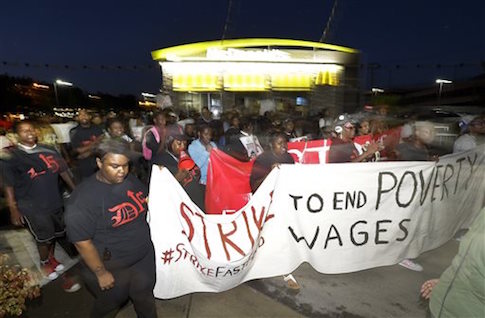The union-backed fast food strikes targeting McDonalds have embraced "mob style tactics" in order to advance their agenda, according to critics.
SEIU organizer Kendall Fells revealed that the protests are a good method of exerting pressure over franchise owners who do not meet the demands of a $15 starting wage.
"We’re very reasonable individuals. If that doesn’t work we’ll bring 150 people and shut their store down day after day after day," Fells told the liberal audience at the National Employment Law Project (NELP).
While the SEIU’s rhetoric regularly takes aim at the multi-billion dollar corporate parents of franchises, Fells acknowledges that the real people affected by the protests are the small business owners who handle day to day operations of the stores. The vast majority of fast food franchisees earn less than $50,000 per year.
"Their profit margin is so small that they’re kind of forced to make an economic decision," Fells said. "These franchise owners are being, you know, most of them are being squeezed. They’re not making that much money."
Fells also candidly joked about the random nature of the labor agitators’ demands for a $15 wage.
"It was a pretty scientific process: $10 was too low and $20 was too high, so we landed at $15," he said to guffaws from the audience.
The SEIU’s wage proposal is about 50 percent higher than the $10.10 minimum wage that President Obama is trying to push through Congress. Research from the nonpartisan Congressional Budget Office and industry surveys has found that Obama’s proposed wage hike would eliminate up to 1 million jobs and force companies to replace workers with robots.
Matt Haller, spokesman at the International Franchise Association, said that the $15 wage would hurt workers and curb new hiring.
"These protests are politically motivated attempts to increase SEIU’s shrinking membership rolls—and will ultimately hurt the workers they claim to be trying to help," he said. "Small business owners and their employees will bear the brunt of these protests, which could negatively impact the 18 million jobs across the country that franchising supports."
The NELP conference took place in May and drew support from liberal activists, as well as key labor regulators from the Obama administration, as the Washington Free Beacon reported earlier this year. The regulators were equally candid about how the administration planned on targeting the service industry for enforcement.
"I view my task as helping to work with the people in the agency and in concert with worker advocates," Department of Labor Wage and Hour Division Administrator David Weil told the conference.
Weil said the department had "undertaken a bunch of specific initiatives in particular industries," in order to crack down on employers. Regulators have focused specifically on "the hotel industry, the restaurant industry, construction, the agricultural sector, [and] healthcare."
"We’ve developed over time specific approaches to dealing with that and approaches to dealing with that and again approaches that are not just informed by saying ‘industry X has a lot of problems,’ but also ‘here’s how industry X is structured and here is how we can really affect change—how we can really make sure that when we go in the effects of that investigation ripple outward," he said.
SEIU’s agitation has also attracted the support of radicals. One McDonalds worker who has participated in the strikes at New York City restaurants told 2014 National Conference of Workers World Party that his goal is to use the strikes to bring about a socialist utopia.
"Some question whether socialist agitation and consciousness among fast-food workers is possible. But if not fast-food and other low-wage workers, where else? Capitalism has placed side-by-side some of the most oppressed and exploited segments of the population, who are most in need of a revolutionary change towards socialism," striker Tommy Cavanaugh said. "They participate in an international web of production in which millions of workers all around the world are under common bosses who reap billions from their labor."
The video of Fells’ speech was obtained and published by the Employment Policies Institute, a group that is critical of minimum wage increases and union activity. EPI research director Michael Saltsman said that the speech shows that the fast food protests are not designed to actually help workers.
"This video confirms what many small business owners already know but the media has generally ignored: Fast food protests are a largely stage-managed event backed by unions which put theatre and intimidation ahead of the employees’ interests," he said in a statement.
